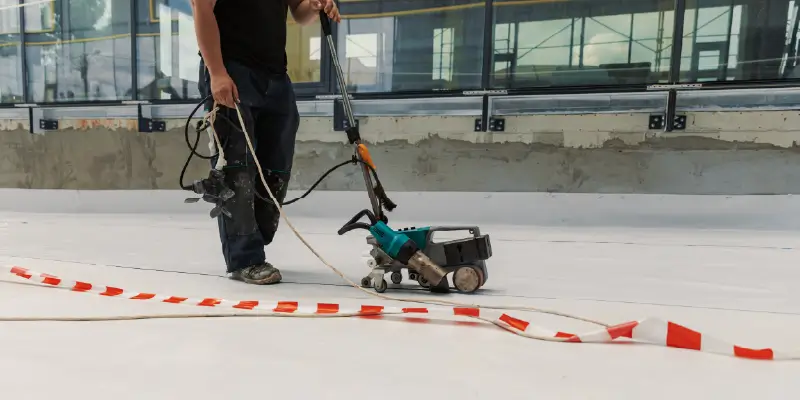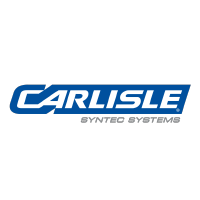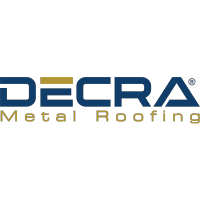About This Blog
Welcome to your one-stop shop for all things roofing in Alabama! Whether you're a homeowner concerned about your residential roof or a business owner overseeing a commercial property, this blog is here to be your trusted resource. We'll delve into everything related to keeping your roof in top shape, from understanding the need for replacements and repairs to exploring the benefits of proactive maintenance plans. Stay informed and make confident decisions about your Alabama roofing needs with our insightful articles and expert advice.
Popular Categories

Selecting the Right Low Slope Roofing for Huntsville Commercial Properties
What is a Low-Slope Roofing System?
To begin, let's clarify what constitutes a low-slope roof. In roofing terminology, a low-slope roof is defined as having a pitch of 3:12 or less. This means the roof rises 3 inches for every 12 inches of horizontal run, resulting in a gentle incline. Low-slope roofs are often found in commercial and industrial settings around Huntsville because they efficiently cover larger areas and are more cost-effective. They require specialized roofing materials and installation techniques to ensure proper drainage and prevent water ponding, which can lead to leaks and damage.
Common Low-Slope Roofing Systems used on Commercial Properties in Huntsville
Choosing the right roofing system for your commercial property in Huntsville begins with understanding your options. Let’s explore some of the most popular low-slope roofing systems to help you make an informed decision:
- Built-Up Roofs: Built-up roofs are a traditional roofing solution consisting of multiple layers of asphalt and reinforcing fabric.
- Modified Bitumen: Modified bitumen roofing is a type of asphalt roofing that combines the benefits of traditional built-up roofing (BUR) with modern materials. We’ll delve into the various types of modified bitumen systems later in this article.
- Single-Ply Roofing: Single-ply roofing systems are composed of a single layer of roofing membrane made from synthetic materials. These roofs are known for their lightweight nature, ease of installation, and exceptional flexibility. Additionally, single-ply roofing offers variations tailored to specific applications, which we'll explore in detail later in this article.
In commercial roofing, selecting the right system is essential for ensuring long-term performance and durability. Each roofing option offers distinct advantages and disadvantages, so let’s take a closer look at each one to help you make an informed decision.
Built-Up Roofs (BUR)
This layered approach provides excellent durability and protection against the elements, making BUR a reliable choice for many commercial buildings. The multi-layer construction contributes to its strength and resistance to weathering.
Pros:
-
Durability: BUR systems are known for their durability and resistance to harsh weather conditions, including heavy rain, strong winds, and UV rays. The multiple layers of asphalt and reinforcing fabric provide robust protection.
-
Waterproofing: The layered construction of BUR systems offers excellent waterproofing capabilities. The layers work together to prevent leaks and water infiltration.
-
Low Maintenance: BUR systems typically require less frequent maintenance compared to some other roofing options. When properly installed, they offer long-term performance with minimal upkeep.
-
Fire Resistance: Built-up roofs often have good fire-resistant properties due to their layered construction and the use of fire-resistant materials.
Cons:
-
Heavy Weight: BUR systems are relatively heavy due to the multiple layers of asphalt and reinforcing fabric. This weight can add stress to the building structure and may require additional structural support.
-
Installation Complexity: The installation of BUR systems is labor-intensive and requires skilled professionals. The process involves applying multiple layers, which can increase installation time and costs.
-
Cost: The initial cost of BUR systems can be higher compared to some other roofing options. However, the long-term durability may offset the upfront expense.
-
Repair Challenges: While BUR systems are durable, repairing them can be challenging. If a leak or damage occurs, it may require removing and replacing multiple layers to address the issue effectively.
-
Odor and Fumes: The installation of BUR systems involves the use of hot asphalt, which can produce strong odors and fumes. Proper ventilation is needed during installation to minimize discomfort.
Overall, built-up roof systems offer strong protection and durability but may come with higher installation costs and complexity.
Modified Bitumen Roof Systems
Modified bitumen roofing systems typically come in rolls, each approximately 36 inches wide. There are two primary installation methods for these systems:
- Torch-Down Installation: This method involves using an open flame to heat the asphalt in the roofing material, which then melts and bonds to the adjoining rows. This technique ensures a strong and durable seal.
- Cold-Applied Installation: This method relies on adhesives to bond the roofing material to the adjoining rows. It avoids the use of open flames, making it a safer option in some situations and suitable for certain applications.
- Self-Adhered Installation: Self-adhered systems have adhesive bottom layers that can be overlapped and fixed to the roof without the need for torches or chemical based adhesives.
All three methods offer effective results, and the choice between them depends on the specific requirements of your roofing project and safety considerations.
Pros:
- Durability: Modified bitumen roofs are known for their strength and ability to withstand harsh weather conditions. They are highly resistant to UV rays, temperature fluctuations, and physical damage.
- Ease of Installation: The installation process for modified bitumen roofs is relatively straightforward, and it can be applied in various ways, including torch-down, cold-applied, and self-adhered methods.
- Cost-Effectiveness: Compared to some other roofing options, modified bitumen roofs are often more affordable, making them a budget-friendly choice for commercial properties.
Cons:
- Maintenance Requirements: While modified bitumen roofs are durable, they may require regular inspections and maintenance to address any issues such as seam failures or damage from foot traffic.
- Limited Lifespan: Although modified bitumen roofs can last 10-20 years with proper care, they typically have a shorter lifespan compared to some other commercial roofing systems.
- Installation Challenges: Proper installation is critical for the performance of modified bitumen roofs. Inexperienced contractors may face challenges, leading to potential issues down the line.
Single-Ply Roofing
Single-ply roofing systems consist of a single layer of synthetic roofing membrane, available in materials such as TPO (thermoplastic polyolefin), PVC (polyvinyl chloride), and EPDM (ethylene propylene diene monomer). These systems are prized for their flexibility, lightweight construction, and ease of installation. However, each material offers unique benefits suited to specific applications:
-
PVC: Ideal for environments like restaurants, PVC roofing excels in resisting grease and chemicals released through rooftop ventilation systems, making it a durable choice for such applications.
-
EPDM: Known for its exceptional flexibility, EPDM is well-suited for commercial properties that experience extreme temperature fluctuations. Its ability to stretch and contract makes it a reliable option for varying weather conditions.
-
TPO: TPO roofing provides a cost-effective solution for commercial buildings with minimal tree coverage and where protection from grease or chemical exposure is less of a concern. Its reflective properties can also help with energy efficiency.
Choosing the right single-ply roofing material depends on your building's specific needs and environmental conditions.
Pros:
- Energy Efficiency: Single-ply roofing materials, especially TPO and PVC, are known for their reflective properties, which can help reduce cooling costs and improve energy efficiency.
- Seam Strength: Single-ply roofing systems feature strong, welded seams that provide excellent water resistance and reduce the risk of leaks.
- Longevity: Many single-ply roofing systems offer a longer lifespan compared to modified bitumen, with some options lasting 20-30 years or more with proper maintenance.
Cons:
- Initial Cost: Single-ply roofing systems can be more expensive to install compared to modified bitumen roofs, though the long-term benefits may offset the initial investment.
- Vulnerability to Punctures: While single-ply roofs are generally durable, they can be susceptible to punctures or tears, particularly in high-traffic areas.
- Specialized Installation: Proper installation requires skilled technicians and specialty equipment. The complexity of the installation process may lead to higher labor costs and material manufacturers require using certain equipment to honor material warranties.
Which Option is Right for Your Huntsville Commercial Building?
When deciding between the many options of commercial low-slope roofing systems, it's essential to consider your specific needs, budget, and long-term goals. For commercial properties in Huntsville, it's advisable to consult with local experts to determine the best solution for your roofing requirements.
If you are searching for a commercial roofing contractor in Huntsville, our team of experienced professionals can provide personalized recommendations based on your property's unique needs. At Continental Roofing Company, we have the expertise to guide you through the decision-making process and ensure you get the best roofing system for your commercial property.
For more information contact us today for a free consultation!
Ready to experience the Continental Roofing difference? We are here to transform your roof into a beautiful and durable asset that stands the test of time. Contact our friendly team today to schedule a consultation, request a quote, or learn more about our wide range of roofing services. Discover why countless homeowners in Alabama trust Continental Roofing for their roofing needs. For quality, value, and superior customer service, we’re on Top of It!





